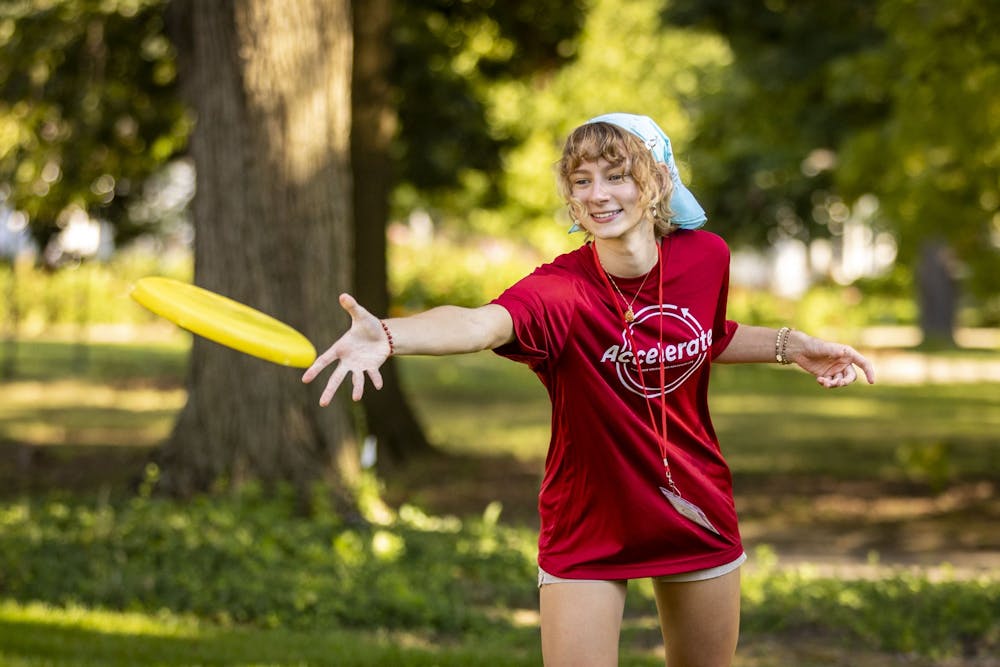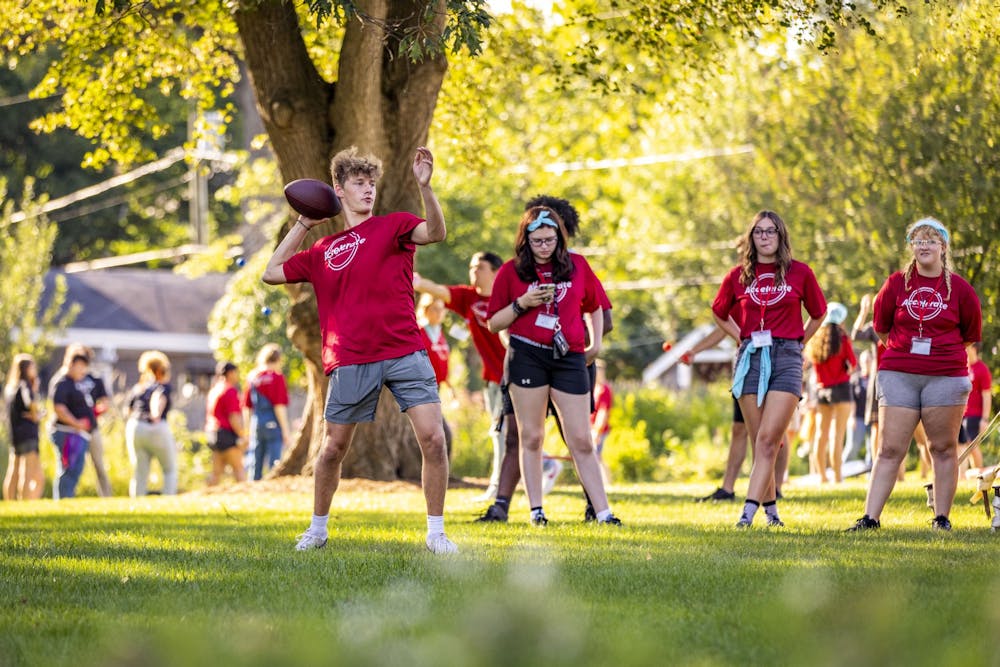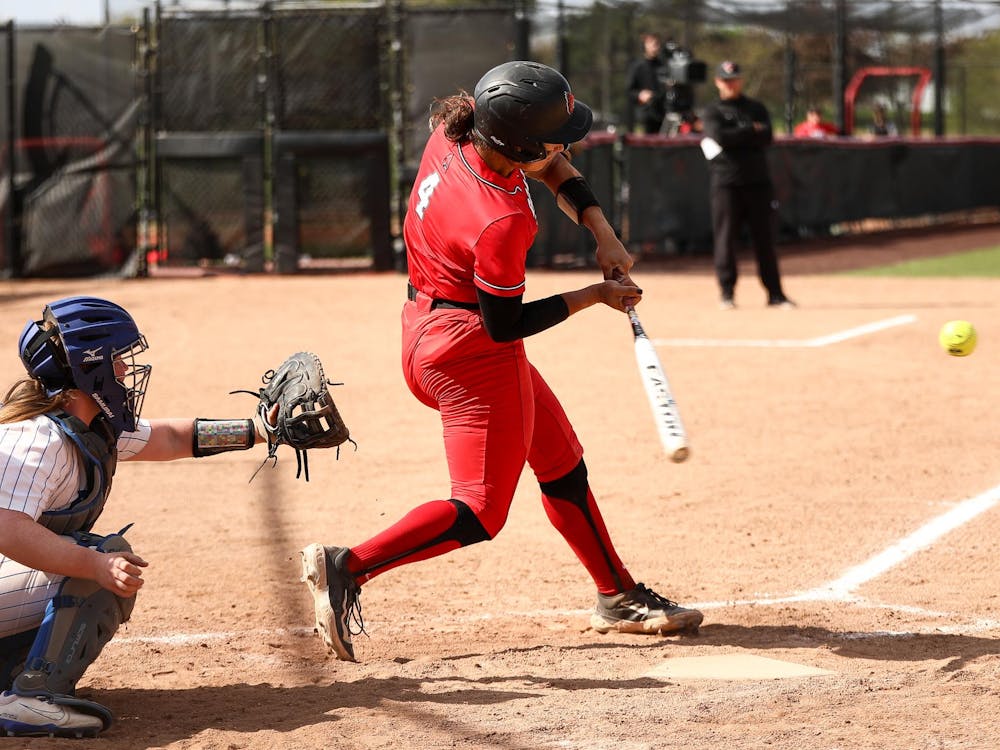EDITOR’S NOTE: Hannah Amos was part of Accelerate in 2021. Leadership of Accelerate has since changed.
Ball State’s campus has come to life as the new academic year has commenced.
The nerves and jitters new students have could make them feel restless. Concerns on navigating classes and making connections may be at the forefront of freshmen’s minds.
The Ball State Office of Student Life’s solution to these feelings and thoughts are Summer Bridge programs. There are seven programs offered: Jump Start, Accelerate, Brown County Adventure, Cardinal Leadership and Service Seminar (CLASS), Early Start, Nantahala Outdoor Center Adventure and REACH (Retain, Engage, Aspire, Connect, Help) Mentor Program.
These programs allow students to move-in to residence halls early, providing freshmen the opportunity to make connections with others and learn about Ball State’s campus prior to the start of the academic year.
Jump Start is a program that started this year for incoming students enrolled in the Teachers College, the College of Communication, Information and Media and the College of Sciences and Humanities. Its held August 10-12 and is free to register, according to program website.
Over 100 students were enrolled in Jump Start, Abby Haworth, director of student life, said via email.
Accelerate is another free program held August 14-18. For the last few days of the program, students helped all the students not in Accelerate move into their dorms, after their previous program days focused on leadership training and learning about campus, according to the program website.
Liz Hartley, assistant director for student leadership and inclusion, said via email that students can apply through an online application found on the Housing and Residence Life housing portal.

For summer 2022, 157 students were enrolled in Accelerate, Katie Yelaska, graduate coordinator for student leadership, said via email.
This was Hartley and Yelaska's first year in charge of Accelerate.
“I am starting my first year here at Ball State and in my role as the Coordinator for Student Leadership,” Yelaska said. “Accelerate has been my first big ‘project’ here on campus, and there truly was no better feeling than seeing first year students build lasting connections and gain leadership skills through our program.”
Accelerate takes place the same time as Early Start, CLASS and REACH.
Early Start is an academic program that freshmen can register for $135. Students had the opportunity to register for 13 different workshops in the mornings, and social activities took place in the evenings and afternoons, Laura Pittman, program director, said.
Students had the opportunity to tour Christy Woods, play games in the Jo Ann Gora Student Recreation and Wellness Center and visit the Charles W. Brown Planetarium.
“They get to hopefully make friends with people earlier [than the start of school],” Pittman said. “So they're in this workshop with other students, but then they're part of this summer bridge program as a whole that has hundreds of students involved, and so it's a way for them to connect with people early.”
With Early Start, students are able to gain college credit through the workshops, some of which were about stage and screen violence, Adobe Creative Cloud and criminal justice. Early Start caps their number of students at 200.
The Office of Student Life, though it oversees all of the summer bridge programs, is most prominently involved with CLASS, Haworth said.
CLASS is about campus leadership, Haworth said, and they learn “the Social Change Leadership Model” and also give the students an opportunity to serve in the Muncie community.”
Like Early Start, CLASS has a registration fee of $135.
REACH is run through the Multicultural Center and directed towards students of color and first generation students, Huy Huynh, assistant director of the Multicultural Center, said. The program is not limited to students in those groups and the primary focus of the program is community building.
Huynh is in charge of scheduling the program and this was his second year in charge.
“All of my programs that I created, all the activities that we had, were centered on making sure that students know that they had a community here so that they can feel like they belong,” Huynh said.
One activity that helped give a sense of community was a race and ethnicity support group called “Voices,” which the Multicultural Center holds year-round. In this activity, students could come and talk to counselors of color and other students about race and ethnicity. The topic of “Voices” during REACH was what it was like to attend a predominately white institute (PWI), Huynh said.
“I think students really understood what they were coming into, coming into Ball State, especially for those who have never been to a PWI before,” Huynh said. “There's definitely some culture shock in there as well, and so just them, getting to know things beforehand has been really helpful, and that's a huge benefit for them as well.”
Brown County Adventure and Nantahala Outdoor Center Adventure are a part of outdoor pursuits. Nantahala Outdoor Center Adventure has a $500 registration fee, and was held July 10-14, according to the program website. Brown County Adventure has a $180 registration fee, and was held July 18-21, according to the program website.
Both of these Summer Bridge programs start on Ball State’s campus, and take students off campus. Students have the opportunity to stay a night in a residence hall and learn about the resources in the Recreation Center, such as the climbing wall.
Brown County Adventure takes students to Nashiville, Indiana, and they stay at Brown County State Park, according to the program website. Nantahala takes students to Bryson City, North Carolina, and they spend three nights in the Smoky Mountains.
Upperclassmen can be involved in some of these programs as mentors, like Jarron Tichenor, a fifth year architecture major, who was a mentor in the REACH program.
“I feel like I've been at school a while,” Tichenor said. “So, I think it's only right to kind of give back and help spread awareness about things that I wish I knew coming in.”
Tichenor was asked to be a part of a panel for REACH the previous year in summer 2021. Accelerate and CLASS also offer opportunities for upperclassmen to act as mentors.
In Accelerate, there are two ways upperclassmen can be involved. They can be Accelerate Connection Coordinators (ACCs) or an Accelerate Program Director (APD), Yelaska said.
“ACCs become mentors to participants during Accelerate and are responsible for fostering connections, being a support for students and facilitating program activities,” Yelaska said.
There were 11 ACCs this year.
The APD helps plan out activities Accelerate does, trains the ACCs and monitors the program while it’s in action.
Overall, over 400 students were enrolled in a summer bridge program this year, not including the over 100 enrolled students in Jump Start, said Haworth. She said The Office of Student Life plans to expand the programs.
Contact Hannah Amos with comments at hannah.amos@bsu.edu or on Twitter @Hannah_Amos_394.





